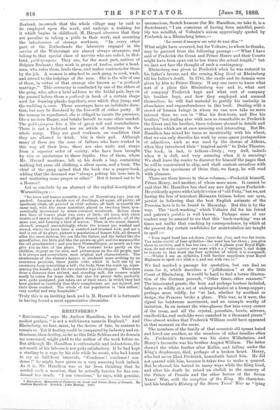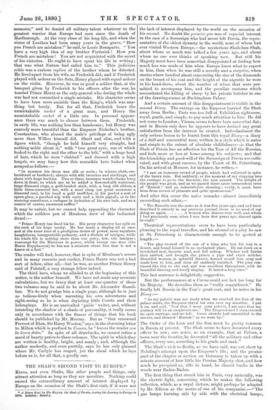RHEINSBERG.*
RIIEINSBERG," says Mr. Andrew Hamilton, in his brief and modest preface, " is not a well-known name in England." And Rheinsberg, we fear, must, by the decree of fate, be content to remain so. Yet if destiny could be conquered by industry and en- thusiasm, then destiny, so far as this little Schloss and its domain are concerned, might yield to the author of the work before us. But although Mr. Hamilton is enthusiastic and industrious, the net result of his labours is not quite satisfactory. If he had kept a, starling in a cage by his side while he wrote, who had learnt to cry at half-hour intervals, " Condense ! condense ! con- dense !" he might have given us a very amusing book indeed. As it is, Mr. Hamilton was so far from thinking that he needed such a monitor, that he actually fancies he has con- densed too much. " I am conscious," he says, with genuine, • Rheinsberg: lifentortate of Frederick the Great and Prince Henry of Prussia. By Andrew Hamilton. London: John Murray. 1880.
unconscious, Scotch humour (for Mr. Hamilton, we take it, is a Scotchman), " I am conscious of having been mindful, possi- bly too mindful, of Voltaire's axiom approvingly quoted by Frederick in a Rheinsberg letter,-
' Le secret d'ennuyer eat celui de tout dire.' "
What might have occurred, but for Voltaire, to whom be thanks, may be guessed from the following passage :—" What I have said of Frederick the Great and Prince Henry and their Courts might have been spun out to ten times the actual length;" but. we dare not face the thought of such a contingency.
Rheinsberg was given to Frederick when he was restored to his father's favour, and the coming King lived at Rheinsberg till his father's death. In 1741, the castle and its domain were given by him to Prince Henry. If any one cares to know what sort of a place this Rheinsberg was and is, what sort of company Frederick kept and what sort of company his brother kept, and how they employed and amused themselves, he will find material to gratify his curiosity in. abundance and superabundance in this book. Dealing with a crowd of human beings in whom we can now take no more interest than we can in " Huz his first-born, and Buz his brother," but dealing also with men so remarkable as Frederick the Great and his brother, these volumes abound in details and anecdotes which are at once amusing and interesting. But Mr. Hamilton has mixed his tares so inextricably with his wheat, that we can only describe his work by some queer juxtaposition of adjectives, such as was used by the clowns of Athens, when they introduced their " tragical-mirth" to Duke Theseus. The book, in fact, is tedious lively ; very dull, indeed. when it is dull, and very amusing when it is amusing- We shall leave the reader to discover for himself the pages that he will be constrained to skip, and shall content ourselves with giving a few specimens of those that, we fancy, he will read with pleasure.
There are three heroes in these volumes,—Frederick himself, Prince Henry, and another, of whom more anon. It cannot be said that Mr. Hamilton has shed any new light upon Frederick.
He evidently agrees with Carlyle's view of "old Fritz," but we, not having the fear of truculent Hermann Grimm before our eyes, persist in believing that the best English estimate of the Prussian hero is to be found in Macaulay. But this is by the way. The buck-washing' which Voltaire did for his friend
and patron's poeshie is well known. Perhaps some of our readers may be amused to see that this buck-washing' was at times not unlike that coaching by correspondence, by which at the present day certain candidates for matriculation are taught to spell :-
" Your rapid hand has set down j'ause for Rose, and tres for traits. You make amitie of four syllables—the word has but three ; you give three to carriere, and it has but two.—If it please your Royal High- ness, do not write opinion any more with a g (‘ opingon 1, and deign to restore to that word the four syllables of which it is composed. Whilst I am on syllables, I will further supplicate your Royal Highness to spell vice with a c, and not with two ss."
We had marked a passage for quotation, but can find no room for it, which describes a "jollification" at the little
Court of Rheinsberg. It would be hard to find a better illustra- tion of the German proverb, " Other times, other manners." The intoxicated guests, the host and perhaps hostess included, behave as wildly as a set of undergraduates at a bump supper; perhaps more wildly, for " at last, whether by accident or design, the Princess broke a glass. This was, as it were, the signal for boisterous merriment, and an example worthy of imitation. In an instant the wine-glasses flew into every corner of the room, and all the crystal, porcelain, bowls, mirrors, candlesticks, and such-like were smashed in a thousand pieces." One almost wishes that Frederick William could have appeared at that moment on the scene.
The members of the family of that eccentric old tyrant hated and loved one another, as the members of other families often do. Frederick's favourite was his sister Wilhelmina, and Henry's favourite was his brother August William. The latter showed the white feather after Kollin, and falling under the King's displeasure, died, perhaps of a broken heart. Henry, who had never liked Frederick, henceforth hated him. He did not quarrel with him, because it takes two to make a quarrel. But he showed his hatred in many ways while the King lived, and after his death he raised an obelisk to the memory of the Prince of Prussia and the other heroes of the Seven Years' War, with the exception of the Sing. He character- ised. his brother's History of the Seven Years' War as "lying memoirs,"_ and he denied all military talent whatever to the greatest warrior that Europe had seen since the death of Marlborough. At the very close of his long life, and when the victor of Lenthen had been many years in the grave, " How you French are mistaken !" he said, to Louis Bonaparte. " You have a very high idea of my brother Frederick ! How you French are mistaken ! You are not acquainted with the secret of his victories. He ought to have spent his life in writing ; that was what Nature had called him to." This judicious
critic was a curious replica of the brother whom he detested. He lived apart from his wife, as Frederick did; and if Frederick played with ardour on the flute, Henry played with equal ardour on the violin. Moreover, he was so good a soldier that, at the banquet given by Frederick to his officers after the war, he toasted Prince Henry as the only general who during the whole war had not committed a single mistake. His character seems to have been more amiable than the King's, which was any- thing bat lovely. But for all that, Frederick bears the unmistakable cachet of a great man, and Henry the unmistakable cachet of a little one. In personal appear- ance there was much to choose between them. Frederick, in early life, was nothing less than handsome ; but Henry was scarcely more beautiful than the Emperor Nicholas's brother, Constantine, who abused the male's privilege of being ugly more than Wilkes himself did. Short and slim, and with a figure which, " though he held himself very straight, had nothing noble about it," with " two great eyes, one of which looked to the right and the other to the left," with a huge head of hair, which he wore " clubbed " and dressed with a high toupee, we may fancy how this mannikin hero looked when arrayed as follows :- " In summer his dress was silk or satin ; in winter, cloth, em- broidered or bordered; always with silk breeches and stockings, and shoes with huge buckles. Two or'three immense watch-chains hung down in front, to which are to be added a flowered-silk waistcoat, large diamond rings, a gold-headed stick, with a long silk ribbon, a little three-cornered hat, with a steel clasp (on great occasions a diamond one), in his hand a gold snuff-box, in his pocket a sort of opera-glass, a perched wig with curls and a little pigtail; or in the morning sometimes, a cadogan in imitation of his own hair, and as a matter of coarse, enormous ruffles."
It may be unfair, but we cannot help appending the character which the ruthless pen of Mirabeau drew of this bedizened dwarf :—
" Prince Henry has fixed his lot. His petty character has split on the rock of his huge vanity. He has made a display all at once and at the same time of a prodigious desire of power, most repulsive haughtiness, insupportable pedantry, and a disdain of intrigue, while his whole life is nothing more than one petty, low, vile intrigue ; contempt for the Ministers in power, whilst except one man (the Baron Knyphausen) he has not a creature about him that is not a knave or a fool."
The reader will find, however, that in spite of Mirabean's severe and in many respects just verdict, Prince Henry was not a bad sort of fellow, after all,—but he was, as another Prince Henry said of Falstaff, a very strange fellow indeed.
The third hero, whom we alluded to at the beginning of this notice, is the author himself. We have not made any accurate calculations, but we fancy that at least one-quarter of these two volumes may be said to be about Mr. Alexander Hamil- ton. We do not grudge him a single page, although he is just as tedious-lively when narrating his own adventures and sight-seeing as he is when depicting little Courts and their belongings. He is an unrivalled 'guide ' writer, and, without intending the shadow of a shade of personality, it really seems only in accordance with the fitness of things that his book should be published by Mr. Murray. But as " that renowned
Provost of Eton, Sir Harry Wooton," says, in the charming letter to Milton which is prefixed to Comm, he "leaves the reader con la bocca dolce." In spite of all drawbacks, we cannot refuse a meed of hearty praise to these volumes. The spirit in which they are written is healthy, bright, and manly ; and, although the author modestly, and even prettily, says be has only gleaned where Mr. Carlyle has reaped, yet the sheaf which he lays before us is, for all that, a goodly one.



































 Previous page
Previous page